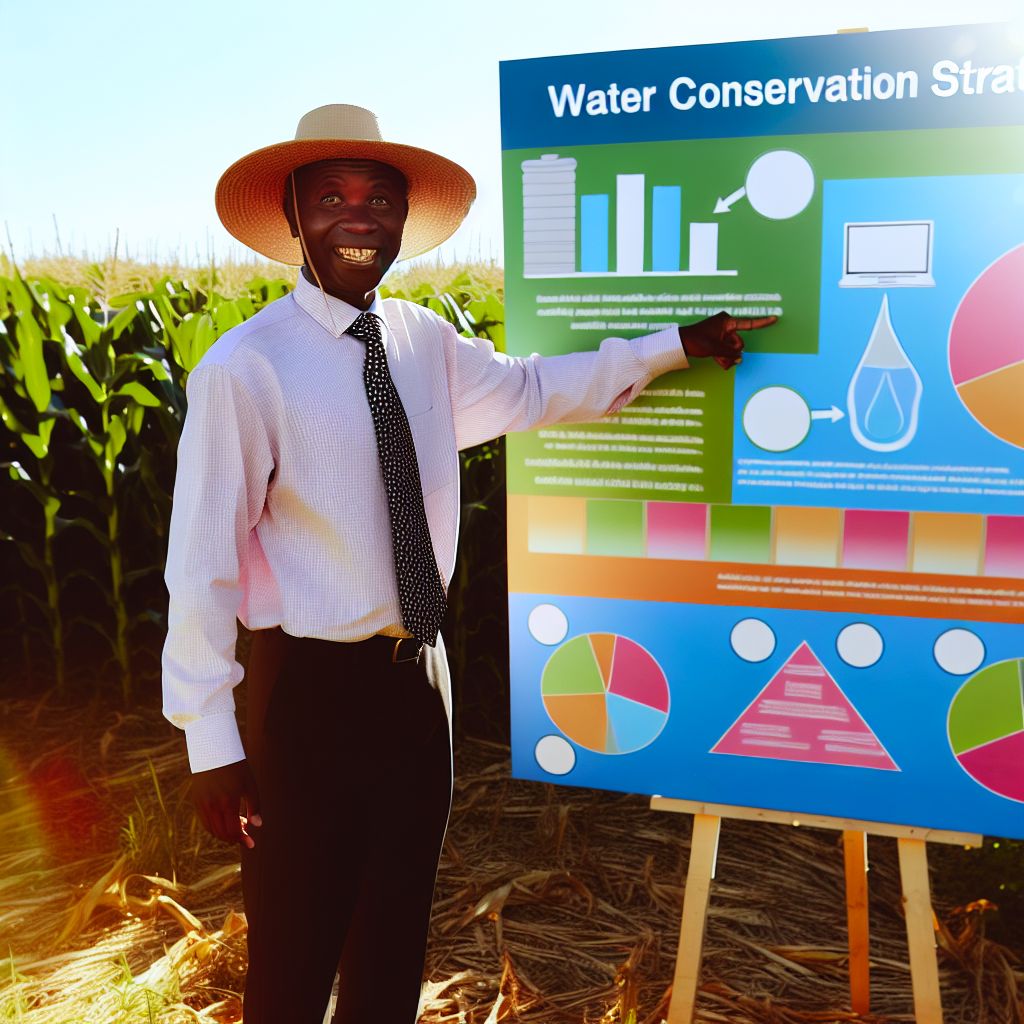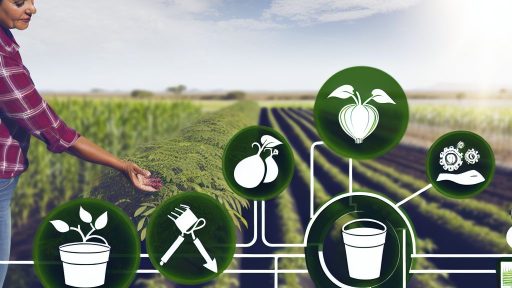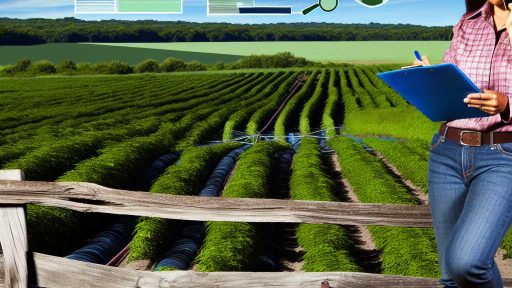Overview of Water Conservation in Agriculture
Importance of Water Conservation
Water conservation plays a crucial role in agriculture.
It helps in sustaining crops amid changing climates.
Moreover, efficient water use preserves natural resources.
Challenges in Agricultural Water Use
Agriculture faces significant water scarcity issues.
Additionally, fluctuating climate patterns exacerbate this challenge.
Farmers often struggle with outdated irrigation techniques.
Current Water Conservation Policies
Governments increasingly recognize the need for water conservation.
They implement various policies to address agricultural water use.
Many programs focus on sustainable practices and technology.
Innovative Strategies for Water Management
Farmers adopt innovative irrigation techniques like drip irrigation.
This method significantly reduces water wastage.
Smart sensors help monitor soil moisture levels effectively.
Long-Term Benefits of Water Conservation
Implementing conservation practices leads to better crop yields.
Furthermore, it enhances the resilience of farming systems.
Ultimately, it contributes to sustainable food systems.
Transform Your Agribusiness
Unlock your farm's potential with expert advice tailored to your needs. Get actionable steps that drive real results.
Get StartedImportance of Water Conservation Strategies
Essential for Agricultural Sustainability
Water conservation strategies are vital for supporting sustainable agriculture.
They protect the environment by preserving precious water resources.
Moreover, efficient water use can enhance crop yields significantly.
Farmers who adopt these strategies often see improved soil health.
Economic Benefits
Implementing water conservation can lead to lower operational costs.
Farmers save money on water bills and reduce the need for irrigation infrastructure.
Additionally, conserving water can mitigate risks associated with droughts.
This approach helps to stabilize financial returns during variable weather conditions.
Supporting Food Security
Water conservation plays a critical role in ensuring food security.
As global populations grow, sustainable practices become increasingly essential.
Efficient water usage allows for consistent crop production.
This, in turn, addresses the rising food demand globally.
Encouraging Innovative Practices
Adopting water conservation encourages farmers to explore innovative methods.
Techniques such as drip irrigation conserve water while optimizing efficiency.
Furthermore, integrating technology can provide real-time data for better decision-making.
Such advancements promote resilience in the agricultural sector.
Various Water Conservation Techniques in Agriculture
Understanding Drip Irrigation
Drip irrigation delivers water directly to plant roots.
This method reduces evaporation and runoff significantly.
Farmers can customize the system based on crop needs.
As a result, it maximizes water efficiency and crop yield.
Implementing Rainwater Harvesting
Rainwater harvesting captures and stores rain for later use.
This technique provides a sustainable water source for irrigation.
It can reduce dependence on groundwater sources.
Farmers can save costs and improve water availability.
Showcase Your Farming Business
Publish your professional farming services profile on our blog for a one-time fee of $200 and reach a dedicated audience of farmers and agribusiness owners.
Publish Your ProfileUtilizing Soil Moisture Sensors
Soil moisture sensors measure the moisture level in the soil.
This technology helps farmers apply water effectively.
By using this data, they minimize excess watering.
Ultimately, this leads to substantial water conservation.
Practicing Crop Rotation
Crop rotation enhances soil health and reduces water needs.
Diverse crops improve water retention and reduce erosion.
This technique also disrupts pest cycles, benefiting crops.
Consequently, farmers rely less on irrigation methods.
Adopting Mulching Techniques
Mulching involves covering soil with organic materials.
This practice reduces evaporation and keeps soil moist.
It also suppresses weed growth, cutting down on competition.
Farmers often find improved soil conditions with mulch.
Implementing Conservation Tillage
Conservation tillage minimizes soil disturbance during planting.
This approach helps retain soil moisture and structure.
It also enhances biodiversity and improves water infiltration.
The result is healthier soils and better water retention.
Integrating Agroforestry Practices
Agroforestry incorporates trees and shrubs into farming systems.
These elements improve water management and reduce erosion.
Tree roots help maintain soil moisture levels effectively.
Moreover, agroforestry provides additional income through timber or fruit.
Using Cover Crops
Cover crops prevent soil erosion and enhance moisture retention.
These crops improve soil health while reducing water runoff.
Farmers often use legumes to fix nitrogen in soil.
This practice promotes sustainable agricultural systems.
Delve into the Subject: Top Renewable Energy Tax Credits Available to Farmers
Role of Technological Innovations in Water Management
Introduction to Technological Advancements
Technological innovations revolutionize water management practices in agriculture.
These advancements enhance efficiency while minimizing water wastage.
Furthermore, they provide farmers with tools to optimize their water use.
Precision Irrigation Systems
Precision irrigation systems allow targeted water application.
One popular method is drip irrigation.
This technique delivers water directly to plant roots.
As a result, it reduces evaporation and runoff significantly.
Moreover, it promotes healthier plant growth through adequate hydration.
Soil Moisture Sensors
Soil moisture sensors play a crucial role in modern agriculture.
They provide real-time data about soil conditions.
Farmers can adjust their irrigation schedules based on this data.
This practice prevents overwatering and conserves valuable water resources.
Consequently, it leads to increased crop yields and sustainability.
Water Recycling Technologies
Water recycling technologies reduce the demand on freshwater resources.
These systems treat and reuse agricultural runoff and wastewater.
Showcase Your Farming Business
Publish your professional farming services profile on our blog for a one-time fee of $200 and reach a dedicated audience of farmers and agribusiness owners.
Publish Your ProfileFor instance, some farms implement constructed wetlands for filtering runoff.
This method allows them to repurpose water for irrigation effectively.
Ultimately, it contributes to sustainable farming practices.
Data Analytics and Remote Sensing
Data analytics and remote sensing tools enhance decision-making in agriculture.
They analyze large datasets to provide insights into water usage patterns.
Farmers can assess which areas need more attention during dry spells.
Additionally, remote sensing allows for monitoring crop health and water stress.
This capability helps farmers respond swiftly to changing conditions.
Innovating for Future Needs
Investing in water management technology is vital for future sustainability.
As climate change intensifies, resource management will become more challenging.
Innovative technologies will help farmers adapt to these changes.
By focusing on research and development, agricultural policies can support this transition.
Ultimately, effective water management will ensure food security for generations.
Delve into the Subject: Impact Of Trade Policies On Sustainable Agriculture Development
Government Policies Supporting Water Conservation
Regulatory Frameworks
Governments implement regulatory frameworks to promote water conservation in agriculture.
These regulations often include restrictions on water usage in drought-prone areas.
Farmers must adhere to guidelines that limit water consumption for irrigation.
Furthermore, these frameworks encourage the adoption of water-efficient technologies.
Incentive Programs
Incentive programs offer financial benefits to farmers who practice water conservation.
For example, the Sustainable Agriculture Research and Education program provides grants.
These grants support farmers in implementing efficient irrigation techniques.
Additionally, tax breaks encourage investments in water-saving equipment.
Education and Outreach Initiatives
Education and outreach initiatives inform farmers about water management practices.
Workshops and seminars demonstrate effective irrigation methods.
Moreover, state agricultural offices distribute educational materials widely.
These efforts aim to improve overall water usage awareness among farmers.
Research and Development Funding
Government funding supports research on innovative water conservation technologies.
This funding drives advancements in drought-resistant crop varieties.
It also facilitates the development of smarter irrigation systems.
Research findings are shared with the agricultural community for broader implementation.
Collaborative Partnerships
Collaborative partnerships enhance water conservation efforts across regions.
Governments often team up with non-profit organizations to promote best practices.
These partnerships create networks for sharing resources and knowledge.
This collective approach bolsters the impact of individual water conservation initiatives.
Learn More: Farm-To-Table Policies and Their Role in Sustainable Agricultural Practices

Case Studies of Successful Water Conservation in Agriculture
Drip Irrigation Implementation in California
California farmers have adopted drip irrigation systems widely.
This method offers precise water delivery to crops.
As a result, it reduces water waste significantly.
Moreover, farmers report improved crop yields.
The system also minimizes weed growth.
Showcase Your Farming Business
Publish your professional farming services profile on our blog for a one-time fee of $200 and reach a dedicated audience of farmers and agribusiness owners.
Publish Your ProfileConsequently, farmers use fewer herbicides.
Rainwater Harvesting in Australia
Australian farmers have embraced rainwater harvesting techniques.
These techniques capture and store rain for irrigation.
This practice enhances water availability during dry spells.
Farmers observe increased efficiency in water use.
Furthermore, it reduces dependence on groundwater sources.
Consequently, this promotes sustainable farming practices.
Crop Rotation Techniques in India
In India, crop rotation has become a popular strategy.
This method improves soil health over time.
Healthy soil retains moisture better.
Additionally, it helps in reducing pest and disease pressure.
This results in lower water usage for irrigation.
Farmers have experienced better financial returns.
Technological Innovations in Israel
Israel is a leader in agricultural water conservation technologies.
Technological innovations include sensors for soil moisture.
These sensors optimize irrigation schedules based on need.
Farmers can thus apply water more efficiently.
Moreover, they can monitor their water use in real-time.
This practice has transformed water management in agriculture.
Government Policies Supporting Conservation
Some governments actively support water conservation strategies.
They offer subsidies for efficient irrigation systems.
Additionally, educational programs inform farmers about best practices.
These initiatives encourage sustainable agricultural choices.
Farmers benefit from both financial and technical assistance.
As a result, water conservation becomes more accessible.
Uncover the Details: Navigating Farm-To-Table Laws: Essential Insights for Agricultural Producers
Challenges and Barriers to Implementing Water Conservation Practices
Economic Constraints
Economic limitations often hinder the adoption of water conservation practices.
Farmers may struggle to invest in new technologies for efficient irrigation.
Additionally, the high initial cost can deter participation in conservation programs.
Many producers prioritize immediate financial returns over longer-term sustainability.
Policy and Regulation Issues
Conflicting policies can create obstacles for effective water management.
Some regulations may not align with sustainable agricultural practices.
Moreover, inconsistent enforcement of existing laws can undermine efforts.
Farmers often find it challenging to navigate complex regulatory environments.
Knowledge and Awareness Gaps
A lack of awareness can impede the adoption of conservation techniques.
Many farmers are unaware of available technologies or methods to save water.
Training and education programs are essential to bridge this knowledge gap.
Sharing successful case studies can inspire wider acceptance and implementation.
Social and Cultural Factors
Social norms play a significant role in agricultural practices.
Many communities maintain traditional methods that resist change.
Showcase Your Farming Business
Publish your professional farming services profile on our blog for a one-time fee of $200 and reach a dedicated audience of farmers and agribusiness owners.
Publish Your ProfilePeer pressure can influence farmers to stick with conventional practices.
Building community support can help promote novel water conservation methods.
Technological Challenges
Access to technology is vital for implementing modern irrigation systems.
Some regions lack infrastructure to support advanced water-saving tools.
Additionally, farmers may face challenges in learning how to use new technologies.
Therefore, increased access to training can facilitate better technology adoption.
Future Trends in Water Conservation Policy Frameworks
Innovative Water Management Techniques
Many agricultural policies will focus on innovative water management techniques.
For example, precision irrigation technology will become more common.
This technology optimizes water use and increases efficiency.
Furthermore, rainwater harvesting will gain popularity among farmers.
Collecting rainwater provides an alternative water supply during dry periods.
Policy Incentives for Sustainable Practices
Future policies will include incentives for sustainable water use practices.
Farmers will receive financial support for implementing water-efficient systems.
For instance, subsidies may encourage the installation of drip irrigation.
Additionally, tax breaks will be available for adopting conservation technologies.
This will promote a shift towards sustainable agricultural practices.
Collaboration with Technological Innovators
Collaboration with technology companies will shape future water policies.
Innovators will develop tools for monitoring and managing water resources.
Smart sensors will provide real-time data on soil moisture levels.
This information will help farmers make informed irrigation decisions.
Consequently, these collaborations will lead to more efficient water usage.
Emphasis on Education and Training
Education will play a crucial role in future water conservation efforts.
Training programs will teach farmers about new technologies and practices.
Workshops will focus on the benefits of water conservation strategies.
Moreover, outreach initiatives will raise awareness of water issues.
This will empower farmers to adopt sustainable water management practices.
Integrated Water Resource Management
Integrated water resource management will gain prominence in agricultural policies.
This approach considers both agricultural and environmental water needs.
It promotes collaboration among various stakeholders in water management.
By fostering partnerships, solutions will address water scarcity effectively.
Even more, policies will support sustainable land and water use practices.




